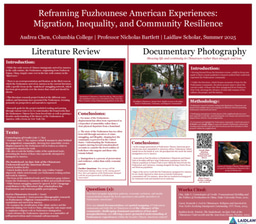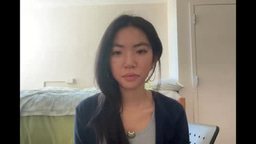Project Outline: Reframing Fuzhounese American Experiences: Migration, Inequality, and Community Resilience

Reframing Fuzhounese American Experiences
Supervised by: Prof. Nicholas Bartlett, Department of Asian and Middle Eastern Cultures, Barnard College of Columbia University
Growing up behind the counter of my family’s Chinese restaurant in Queens, New York, I was surrounded by the sounds of Fuzhounese—loud, fast, and full of life. Yet outside those walls, our stories were reduced to stereotypes: the dime-a-dozen Lucky Dragon restaurant on every other street, the nail technician hunched over gel nails, the construction worker toiling on scaffolding. As a Fuzhounese American, I want to reclaim these narratives and create space for our voices in academic and public discourse. By combining archival work and data analysis, I hope to preserve our history and highlight the resilience that’s too often overlooked.
Project Background:
The Fuzhounese diaspora to the U.S., particularly to New York City, represents one of the most economically precarious and socially stigmatized migrations within Chinese American history. Irregular migration facilitated by snakehead networks, a lack of formal education, and concentration in the service industry have contributed to their marginalization—not only in American society but within broader Chinese American discourses. Dominant narratives often equate Fuzhounese identity with illegality and servitude, sidelining the cultural resilience, informal financial systems, and entrepreneurial spirit that many Fuzhounese communities demonstrate.
This research project aims to recover and reframe Fuzhounese American experiences by mapping their migration patterns, exploring their economic participation, and interrogating their representation in both mainstream and ethnic media.
Research Question:
How have irregular migration patterns, economic exclusion, and media representation shaped the lived experiences and public narratives of Fuzhounese Americans, and how might archival and statistical analysis help reframe their place within the broader Chinese American community?
Methodology:
My project employs a mixed-methods approach, combining archival research, statistical analysis, and media studies. In the initial stages, I will conduct archival work at the Museum of Chinese in America and the NYC Municipal Archives, focusing on materials related to Fuzhounese migration—including oral histories, labor advertisements, and immigration records. I will supplement this with a literature review of both academic and popular texts, identifying recurring themes of mobility, labor, and intra-ethnic marginalization.
Building on this foundation, I will analyze economic data and demographic statistics (using tools like R) to investigate employment trends, wage disparities, and community financial practices such as informal lending networks. Additionally, I will examine Chinese-language newspapers to understand how migration was narrativized and marketed within immigrant communities themselves.
Though not yet finalized, I hope to include interviews with members of the Little Fuzhou community to bring firsthand voices into the conversation. These interviews, if feasible, will offer critical context and human texture to the historical and economic data, while also revealing linguistic and generational shifts within the community.
Objectives:
By reframing Fuzhounese American narratives, this project aims to:
- Highlight the structural inequalities shaping Fuzhounese migration and labor
- Illuminate the economic and cultural strategies of resilience within Fuzhounese communities
- Distinguish the Fuzhounese experience from monolithic “Chinese American” narratives
-
Foster recognition of the Fuzhounese contribution to the multicultural topography of the United States
Ultimately, I seek to write a research paper that integrates data, narrative, and theory in order to elevate Fuzhounese American stories from marginalization to scholarly and public recognition. As a Laidlaw Scholar, I hope to use this project not only to advance academic knowledge but to contribute to a more inclusive, complex understanding of immigrant America.


Please sign in
If you are a registered user on Laidlaw Scholars Network, please sign in